On October 1, Commissioners Floyd and Tracey Tidd take up appointments in the Canada and Bermuda Territory as territorial commander and territorial president of women’s ministries after six years in Australia, most recently as territorial leaders of the newly amalgamated Australia Territory. Watch the installation and dedication service for the Tidds on October 6 at 3:30 pm EDT on our livestream channel.
Prior to their installation, editor-in-chief Geoff Moulton sat down with them to discuss their experiences overseas, from the merger of the two Australian territories, to their response to the Royal Commission’s investigations into sexual abuse, to their groundbreaking Gender Equity Plan.
What’s the best thing about being home?
Tracey Tidd: After six years in Australia we made a lot of friendships, but there is nothing like coming home to spend time with family. During these past few weeks of furlough we’ve been able to share wonderful times with our two children, their spouses and our grandson.
Floyd Tidd: It’s great to be back in that place where you have a sense of roots, a sense of history, and to reconnect with people.
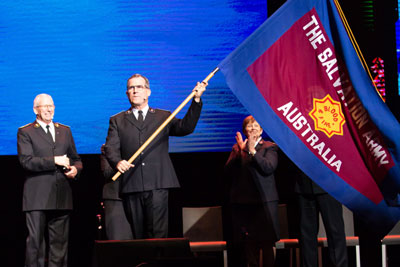 Commissioner Floyd Tidd waves the Army flag at the inauguration of the new Australia Territory as General Brian Peddle looks on
Commissioner Floyd Tidd waves the Army flag at the inauguration of the new Australia Territory as General Brian Peddle looks on
FT: It was more than we could have ever asked or imagined. We left the Canada and Bermuda Territory in June 2013 to serve as leaders in the Australia Southern Territory. Three years later, we became national leaders for Australia as its two territories began transitioning into one, and lastly served as territorial leaders of the new Australia Territory. It was an exciting and dynamic experience. We’ll miss the people of Australia, but I can go on record as saying we won’t miss Vegemite (laughs).
TT: It was a great experience. I recommend all officers take time to serve overseas. Yes, our resilience was tested, but God has shaped us and we have deeper relationship with him. We are grateful for the people who journeyed with us as we aligned the Army in Australia into one territory. They have been challenging times, but also good times. Our roots go deep there.
What were the challenges of merging the two territories?
FT: For 90 years, Australia took the form of two territories: Southern and Eastern. About 25 years ago, questions arose about what was the best administrative model. During our time, a decision was made by International Headquarters (IHQ) to move toward a single territory. We articulated six reasons why we needed to merge: an aligned vision; a united voice; greater impact; better stewardship; increased innovation; and stronger partnerships, both internally and externally. Those became our benchmarks.
There were challenges along the way. Although the two former territories were both Salvation Army in name and brand, they were very different in their administrative systems, thinking and cultures. But the positive outcomes became apparent almost immediately as we aligned around a single mission statement, vision and core values.
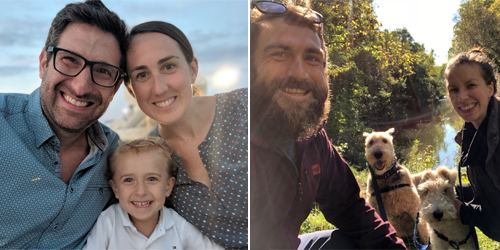 The Tidds' children: Anthony and Kaleena Scocco, with son, Arlo Scocco; and Chris and Kalyn Tidd
The Tidds' children: Anthony and Kaleena Scocco, with son, Arlo Scocco; and Chris and Kalyn Tidd
TT: I think it’s too early to tell. We haven’t started our appointments yet. That being said, we always have to be prepared for change. Change is difficult, especially as we’ve experienced over the last three years. But things are changing all around us—not only within The Salvation Army but outside as well. We have to be prepared to change, because if we don’t we’ll be left behind. First we have to ask: Why are we doing what we are doing? When we are open to change, new opportunities often arise.
FT: Change has always been part of the Canada and Bermuda Territory’s story. I think it is happening and will continue to happen; what the change will look like in the future we aren’t yet certain. These initial months will be a time of listening. We need to catch up on the stories and sense the Spirit of God at work so that we can align and partner with what is already taking place. Catherine Booth said: “There is no improving the future without disturbing the present.” Change is a reality of life—a necessary and hopeful thing.
In 2013, a Royal Commission was appointed by the Australian government to investigate historical incidences of child sexual abuse, some of which were perpetrated in Salvation Army institutions. How did the Army respond?
FT: That was a challenging time for The Salvation Army in Australia. Over 80 years, more than 30,000 children had come through our institutions. We had begun as early as the 1990s to recognize our failure of care and make restitution. As we approached the Royal Commission into Institutional Responses to Child Sexual Abuse, we continued to respond with an apology and worked with survivors to find healing and wholeness. More than that, we vowed to learn from our past and do everything possible to ensure it does not happen again. This required not only a review of all of our policies, but also a culture shift.
As I sat on the witness stand, it was more than just an opportunity to speak on behalf The Salvation Army; it was my chance, as the leader, to “re-present Christ.” We had failed not only in our duty of care, but in our representation of Christ. In every interaction with the public going forward, we want to ensure that we present Christ well in all that we do.
As territorial leader, I made myself available to offer a personal apology to any survivor who wanted to meet with me. I remember sitting with Anne who, at seven years old, had been subjected to abuse in one of our facilities. I asked, “Anne, what are you hoping for out of our time together?” And she said, “I want you to look me in the eye and tell me you will do everything in your power to ensure that my story is never repeated.” I offered her a “yes,” not only for myself but on behalf of everyone in our organization. We must give a priority of care to every vulnerable person who comes to us.
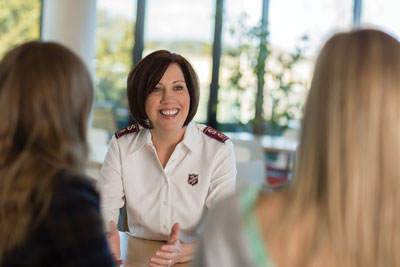 Commissioner Tracey Tidd played a pivotal role in the gender equity initiative in Australia
Commissioner Tracey Tidd played a pivotal role in the gender equity initiative in Australia
TT: We put together a proposal for a Gender Equity Plan that was approved by IHQ as part of the Australia merger. We then appointed a gender equity advocate, who reported directly to the territorial commander. She struck a working group with soldiers, officers, employees and external participants. The first goal was to have a minimum 30 percent female and minimum 30 percent male representation on boards, and including Cabinet and divisional leadership. This approach provided flexibility and prevented tokenism. After a year, we succeeded, and now have a plan for 40 percent minimum going forward.
In the proposal to IHQ, we also addressed “default appointments” (where an officer wife is automatically appointed based on her husband’s assignment). Now, when divisional leaders are appointed, we consider each person individually. If a married woman is the right choice for divisional commander, then she is appointed. If not, consideration should be given for a role that utilizes her passion and skills. Out of six divisions in Australia, three are now led by women officers, two of whom are married. That’s a big step forward for The Salvation Army.
In Canada and Bermuda, we have embraced the concept of integrated mission—Salvationists reaching into their communities to meet practical needs and share the gospel. How do we continue to make that a reality?
FT: I think that is our growing edge. We’ve come to a point in time where the culture of our neighbourhoods doesn’t naturally flow through church buildings. So it’s critical to move out into our communities to be salt and light—as Eugene Peterson describes it, to bring out the “God-flavours” and “God-colours” that are already present. Salt doesn’t have much value unless it leaves the salt shaker. I’m not as concerned about how many people from our communities attend our corps as I am about how well our corps attend to our communities. We’ve done well at building strong corps life in recent years, but must also consider how we are impacting people beyond our walls.
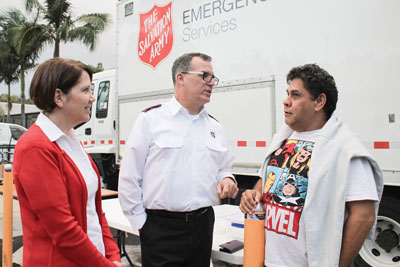 The Tidds enjoy visiting the front lines of Salvation Army ministry
The Tidds enjoy visiting the front lines of Salvation Army ministry
TT: My calling didn’t come right away—it was six months after we were married. At the time, I was very involved in my corps in Sudbury, Ont., but I had no idea what being a Salvation Army officer meant. At first I struggled with it and kept putting it off. But God persisted, and finally I said, “Lord, you’re going to have to help me. I have nothing to offer.” In that moment I said yes, and he’s done immeasurably more than I could ever imagine. And as I look back over these 33 years, I’m here because of who he is and what he has done in and through my life. What motivates me is seeing people transformed, being discipled and coming to know Jesus Christ—that reminds me why I do what I do.
FT: In my teen years as a corps cadet, I felt an initial pull toward officership, but it wasn’t until after university, when I was headed toward medical school, that there was a resurgence of the call. After we were married, we entered training college in 1984 in the Proclaimers of the Gospel Session. What drives me is watching people discover life to its fullest. It’s watching lives transformed by God’s Spirit and knowing we get to be a part of that.
What important leadership lessons have you learned?
TT: I’ve found that you may be leading most when you least expect it or you may be leading least when you most expect it. In other words, leadership is not about my position or rank or how much power I have. Jesus said that whoever wants to lead must be a servant. It’s by taking that humble approach to the role that you are able to influence others.
FT: When we first applied for cadetship, we were interviewed by our divisional commander who asked us to respond to this statement: To be a good leader you must be a good follower. That means following the lead that God is giving us, which comes from his Word and his Spirit but also from the people that he places around us. We don’t lead in a vacuum; we lead together as part of a team. As Philippians 1:3-5 says, we count it a privilege to be partners in the gospel. During our six years as foreigners in the Australian context, we approached our leadership as partnership. We return to Canada and Bermuda with the same goal.
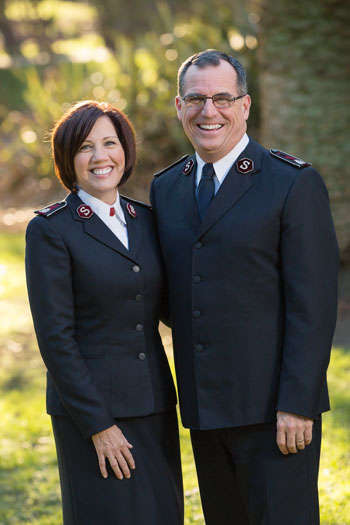 Commissioners Tracey and Floyd Tidd were commissioned in 1986 as Proclaimers of the Gospel
Commissioners Tracey and Floyd Tidd were commissioned in 1986 as Proclaimers of the Gospel
TT: I met a man named Mohammed who struggled with addiction for many years and became a Christian during his time in recovery. He found out he had a two-year-old daughter that he didn’t know he had. She was staying with an aunt because the mother also struggled with addiction. The aunt saw the transformation in Mohammed and gave him visiting rights with his daughter. His life was transformed by the love of Jesus Christ and, in turn, his daughter can now be impacted by that same love. And so it comes full circle.
FT: I remember chatting with a woman who had been through our domestic violence safe house. She had come from China with her partner, but things got violent and she had to escape. Now in a safe place, she had a newborn baby and her parents were visiting from China. Her father pulled me aside and said, “Thank you for being there when we couldn’t be there.” It’s another practical example of how the Army comes alongside people as the presence of Christ. We have the privilege and responsibility as a Salvation Army to be present for people in difficult situations.
How do you unwind and relax?
FT: We enjoy being with people—just being in community with others. We try to do a bit of exercise, reading and home cooking together.
TT: We learned to boogie board in Australia, although there are not a lot of waves to catch here in Canada. But we did buy ourselves a paddle board, which we’ve enjoyed in our down time.
Is there a passage of Scripture that God has impressed on your hearts as you transition?
TT: I claimed a life verse when I entered training college: “Being confident of this, that he who began a good work in you will carry it on to completion until the day of Christ Jesus” (Philippians 1:6). God also gave us a new promise during our journey in Australia: “See, I am doing a new thing!” (Isaiah 43:19). As we travel the territory and listen to the stories, we pray God will help us to see what that new thing is.
FT: I’ve been looking at scriptural examples of transition—for example, from the end of the Exodus in Deuteronomy to the beginning of Joshua. We’re grateful for Commissioner Susan McMillan and her years of leadership here and everything that has been accomplished. Just as Joshua built on what Moses had accomplished, it is our privilege to build on all that has taken place in this territory over the past number of years. And like Joshua we are learning to be bold and courageous (see Joshua 1:6) as we discover what that means.
How can Salvationists support you?
TT: Pray for us and for each other. It will take time for us to catch up with people and meet new Salvationists. We look forward to sharing in ministry together. Pray that as an Army our eyes will be open to all that God has in store for us.
FT: We’re looking to officers, employees, soldiers and volunteers to be our eyes and ears—to see and hear what God is saying to them, and then to share that with us. Let’s join hands together and accomplish what God has in mind for us in the Canada and Bermuda Territory.




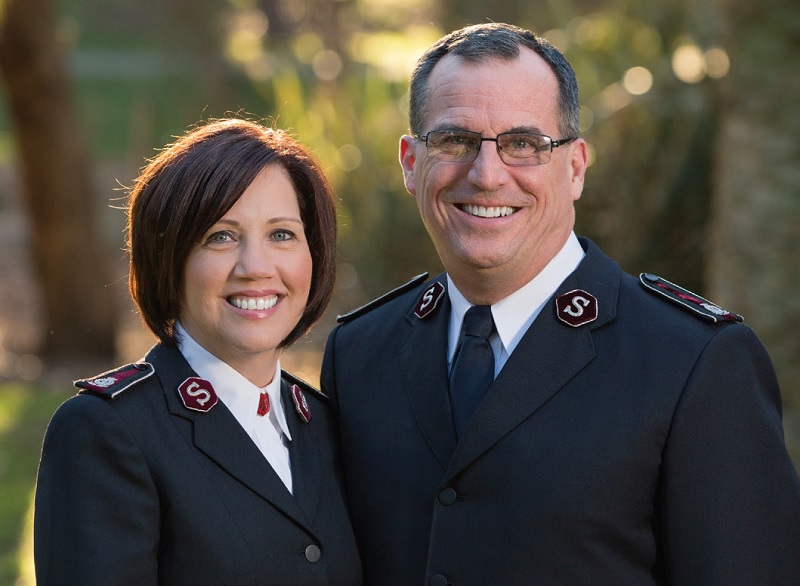

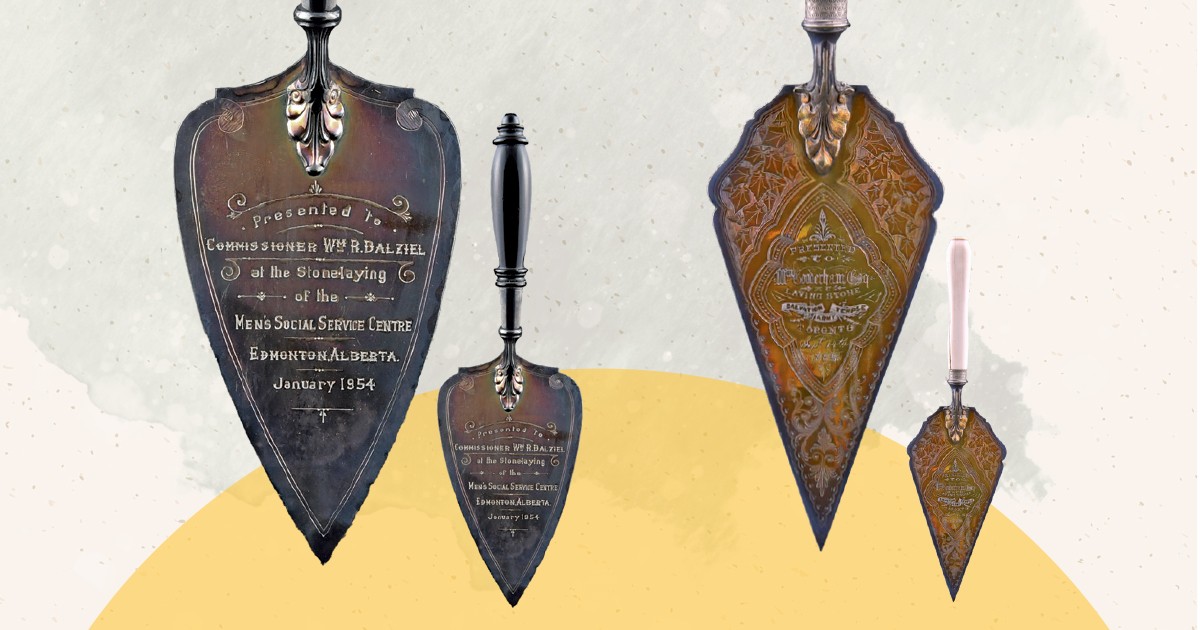



In Him Mrs. Val Grubert